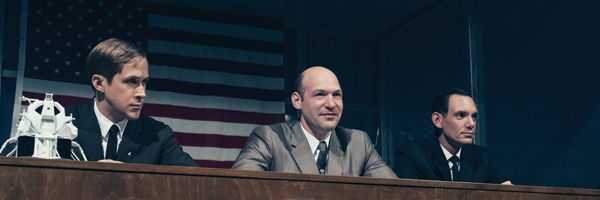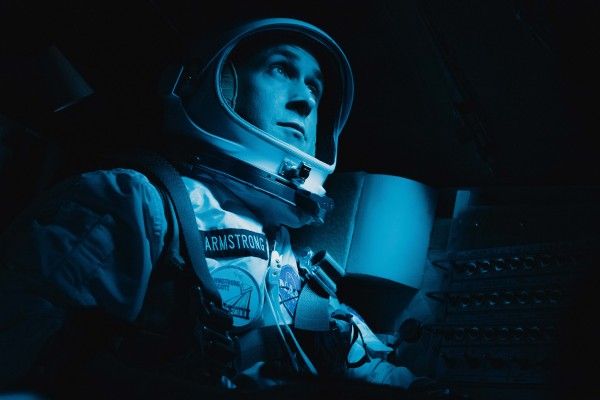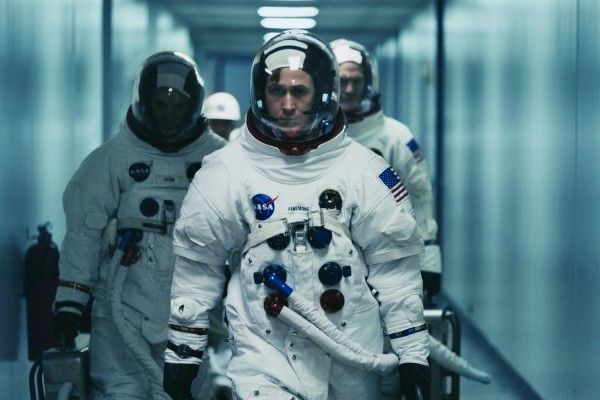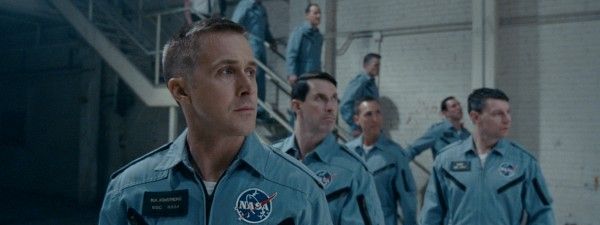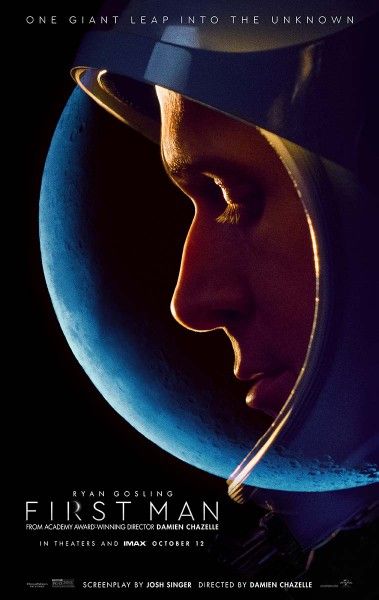One of the most anticipated films of the year, First Man, made its world premiere at the Venice Film Festival last week, but already the film is shrouded in controversy before most folks have even had a chance to see it. The drama hails from Oscar-winning La La Land and Whiplash director Damien Chazelle and Oscar-winning Spotlight co-writer Josh Singer, and is an adaptation of author James R. Hansen’s biography of Neil Armstrong, First Man. The film chronicles the deadly, years-long journey to finally putting a man on the moon, focusing on just how dangerous this mission was, told entirely from the point of view of the astronauts who lived through one of humanity’s greatest feats.
So what’s the controversy? Well, early reactions to the film noted Chazelle’s unique visual style, in which most of the events are shown through the eyes of the astronauts—for instance, when Apollo 11 is taking off, the film doesn’t cut to wide shots of the ship from the outside. Instead, the camera stays inside the ship, so we see what it felt like to be inside this gigantic machine as it rockets towards outer space.
This artistic decision continues through the actual moon landing, and The Telegraph reported that the film doesn’t include a scene in which Armstrong plants the American flag on the moon, which kicked off a firestorm of complaints that the film was unpatriotic from folks who haven't yet seen the movie. This is somewhat false—during the moon landing sequence, the scene dwells more on Armstrong looking back at Earth and considering the accomplishment he just made in the name of mankind. But the flag is in the scene and is visible in multiple shots, according to those that have actually seen the movie.
Gosling was asked about this decision at a press conference in Venice, and he responded that his portrayal of Armstrong is true to how the real Neil Armstrong felt about his herculean feat:
“I think this was widely regarded in the end as a human achievement [and] that's how we chose to view it. I also think Neil was extremely humble, as were many of these astronauts, and time and time again he deferred the focus from himself to the 400,000 people who made the mission possible.”
Gosling said he didn’t think Armstrong “viewed himself as an American hero,” noting, “From my interviews with his family and people that knew him, it was quite the opposite. And we wanted the film to reflect Neil."
Indeed, Armstrong’s sons Rick Armstrong and Mark Armstrong—who have seen the film—subsequently released a statement alongside author James R. Hansen defending First Man and confirming how their father felt:
Although Neil didn’t see himself that way, he was an American hero. He was also an engineer and a pilot, a father and a friend, a man who suffered privately through great tragedies with incredible grace. This is why, though there are numerous shots of the American flag on the moon, the filmmakers chose to focus on Neil looking back at the earth, his walk to Little West Crater, his unique, personal experience of completing this journey, a journey that has seen so many incredible highs and devastating lows.
Chazelle himself also defended the decision in his own statement (via the Associated Press):
"The flag being physically planted into the surface is one of several moments of the Apollo 11 lunar EVA that I chose not to focus upon," he said. "To address the question of whether this was a political statement, the answer is no. My goal with this movie was to share with audiences the unseen, unknown aspects of America’s mission to the moon — particularly Neil Armstrong’s personal saga and what he may have been thinking and feeling during those famous few hours."
The statement from the Armstrongs notes that First Man is not a traditional biopic, and instead attempts to allow viewers inside Armstrong’s head from a unique point of view:
This is a film that focuses on what you don’t know about Neil Armstrong. It’s a film that focuses on things you didn’t see or may not remember about Neil’s journey to the moon. The filmmakers spent years doing extensive research to get at the man behind the myth, to get at the story behind the story. It’s a movie that gives you unique insight into the Armstrong family and fallen American Heroes like Elliot See and Ed White. It’s a very personal movie about our dad’s journey, seen through his eyes.
This story is human and it is universal. Of course, it celebrates an America achievement. It also celebrates an achievement “for all mankind,” as it says on the plaque Neil and Buzz left on the moon. It is a story about an ordinary man who makes profound sacrifices and suffers through intense loss in order to achieve the impossible.
Finally, the Armstrongs’ statement encourages everyone to actually see First Man for themselves rather than judge the film based on a muddled game of telephone:
In short, we do not feel this movie is anti-American in the slightest. Quite the opposite. But don’t take our word for it. We’d encourage everyone to go see this remarkable film and see for themselves.
This is ultimately what’s most frustrating about the whole ordeal—everyone is allowed to have their own opinion about a film, but at least wait until you’ve seen the movie to start criticizing what the film does or doesn’t do, mean, or say.
Ultimately it sounds like the American flag is seen plenty in the film, including during the moon landing, but Chazelle made an artistic decision to focus on a different aspect of the landing itself, in keeping with his unique and non-traditional take on chronicling the life of an extraordinary human being. And yes, extraordinary American.
First Man hits theaters on October 12th, at which point everyone can see for themselves.

